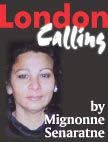|
DAILY NEWS ONLINE |
|
|
|
OTHER EDITIONS |
|
|
|
|
|
|
|
|
|
OTHER LINKS |
|
|
|
|
|
|
  |
London Calling
IT IS almost unthinkable to imagine Mr Darcy, Jane Austen's dashing hero, rounding off a night out with friends at a curry house, writes Richard Alleyne in the Daily Telegraph. But according to a recent discovery, he could well have done. Historians have found that Britain's first Indian restaurant was opened in 1809, in the midst of the Napoleonic wars and during the period which Austen set Pride and Prejudice. The Hindoostone Coffee House was established by Sake Dean Mahomed, an Indian-born entrepreneur, as a purveyor of Oriental food of the "highest perfection" in Marylebone, London, which at the time was residential district for the well-off. Even though the British had already developed a taste for dishes such as kedgeree and mulligatawny soup, the venture failed after two years. The problem was not the food, but a lack of appetite for eating out. "Everybody, especially of that class, ate in their homes and the only restaurant scene as such was in the City where merchants would have their lunch. The restaurant was called a "coffee house" to cash in on the craze for coffee, a new discovery, at the time. All restaurants were called coffee houses whether or not they sold the drink. More than a million patients in the UK are taking statins, the cholesterol lowering drugs, which reduced the risk of heart attacks and strokes. But drugs are being restricted to those with high cholesterol when thousands more lives could be saved if they were prescribed to everyone with deceased arteries. The first comprehensive review of the cholesterol-lowering drugs called statins has found they can cut the risk of a heart attack or stroke by one third, if used in a big enough dose. Colin Baigent, of the clinical trial service unit at the University of Oxford, who led the study, which was published in the Lancet, said "There aren't many drugs that can do that. Given a decent dose, statins are wonder drugs..." There was no evidence that statins increased the incidence of cancer, or that low cholesterol levels caused depression leading to suicide, two charges levelled against the drug. Shivering RudolfSanta Claus has been paid compensation after fighter jets scared his reindeer to death. The Danish Air Force has paid 2854 pounds in part-time Santa Olavi Nikkanoff. His reindeer died of heart failure when two fighter jets roared over his farm. Rudolf had been grazing peacefully at the farm in central Denmark when jets screamed over at low altitude. His death meant that Nikkanoff had only one reindeer left to pull his sleigh at Christmas. He complained to the air force which agreed to pay for a new reindeer and cover his vet's bill. The 'real' ShakespeareExtraordinary new historical evidence suggests that Shakespeare's plays were not written by the assumed bard, but by a politician descended from King Edward III and John of Gaunt. A British scholar, Brenda James and historian Professor William Rubinstein (University of Wales), are proposing that the real Shakespeare was an English courtier and diplomat called Sir Henry Neville. The issue of who wrote the body of the works attributed to William Shakespeare has been hotly debated by academics for centuries. There has always been a suspicion that Shakespeare, the grammar school-educated son of a Warwickshire alderman, who failed to progress to either Oxford or Cambridge universities, could not have possessed the learning or wit to produce plays such as Hamlet, King Lear and Twelfth Night. The claims will be published in a new book (Longman) 'The Truth Will Out: Unmasking the Real Shakespeare' later this month. The authors have meticulously traced connections between Neville's travels abroad and the Shakespeare corpus. For example, between 1599 and 1600, he briefly became ambassador to France, leading; it is claimed, to writing Henry V, in which some scenes were written in French, a language Shakespeare did not speak. Romeo and Juliet, The Taming of the Shrew, Two Gentlemen from Verona, and the Merchant of Venice were all set in northern Italy, which Neville visited in 1581 and 1582. Love's Labour's Lost echoes in part the issues discussed specifically at Oxford University at the time Neville was studying between 1574 and 1579. Many characters in the play were known personally to Neville. Measure for Measure was set in Vienna, which Neville visited in 1580. A theme of the play - laws against immorality, reflects specific ideas Neville encountered when he met a Calvinist philosopher there. There are also striking similarities of style and vocabulary between Neville's private and diplomatic letters and Shakespeare's plays and poems. In addition, word frequency analysis reveals a statistical correlation. Finally, the authors claim to present but long-ignored evidence, in a document, discovered in 1867, that Neville practised faking William Shakespeare's signature. The two scholars propose that Shakespeare was Neville's 'front man', suggesting that the diplomat could not afford to be seen as the author of the plays because some of them were too politically sensitive and controversial. Indeed, if the Elizabethan authorities had known that Neville was the author of Richard II, he would have been probably executed. Neville's fundamental political problem was that he was a member of a rival dynasty to that of the Tudors. His own grandfather and uncle had been executed by Henry VIII. Significantly, Shakespeare's patron was the Earl of Southampton, who was one of Neville's closest associates. Furthermore, Shakespeare's mother, Mary Arden, was a relative of Neville. It is through these two connections, the authors suggest, that Shakespeare became his front man. Scholars have always been puzzled as to how Shakespeare wrote plays requiring detailed geographical and political knowledge and advanced skills in reading Latin, Greek, French, Spanish and Italian textual sources - yet ceased his formal education at the age of 12. |
|
|

